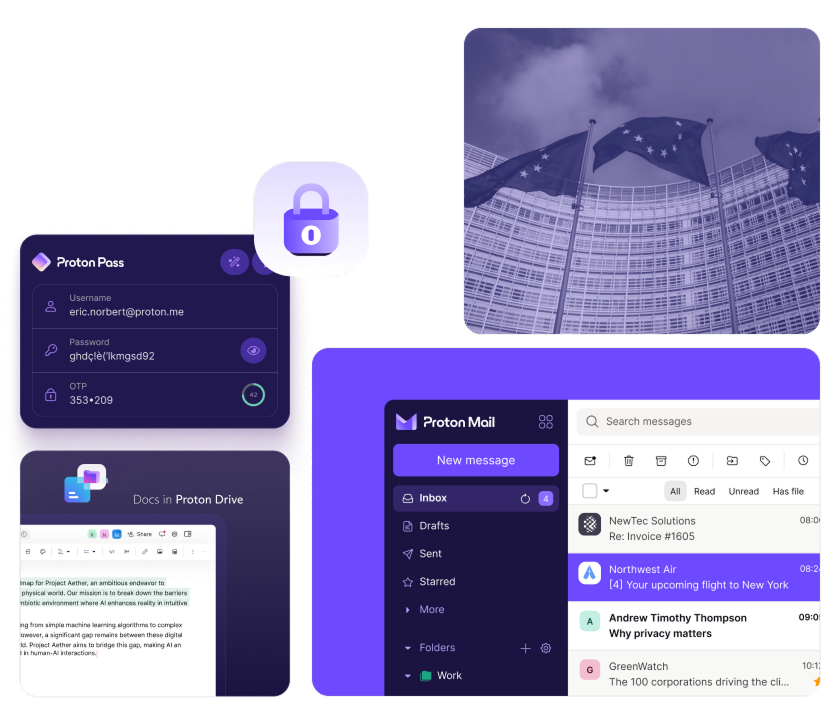Leaked: Politicians’ emails and
passwords on the dark web

Over 4,300 government officials in Europe and the US have had their official email addresses — and even passwords — exposed on the dark web.
Politicians and staffers are using their official email addresses to sign up for everyday accounts, like social media, news sites, and dating apps. If (or when) these services suffer a breach, attackers can use these email addresses to easily identify high-profile targets.
For the average person, this is a serious privacy risk. For public officials, it’s a potential national security threat.

To conduct this investigation, we searched the dark web for information associated with the publicly available email addresses of government officials. In many cases we found that highly sensitive information — including passwords — was freely available on well-known criminal forums.
This presents an obvious cyber security risk if these people were reusing passwords for multiple services. But it also presents an additional risk because the personal information available puts these officials in danger of blackmail or social engineering.
Account security is incredibly important and easy to get wrong. It's vital that we all takes steps to protect ourselves — with tools like a password manager or email aliases — because if even politicians with a higher than normal threat model can make mistakes, so can anyone else.
This investigation would not have been possible without the assistance of Constella Intelligence(new window).
How widespread is the problem?
Institution | Email addresses searched | Email addresses breached | Percentage of email addresses breached | Passwords exposed | Passwords exposed in plaintext |
|---|---|---|---|---|---|
UK House of Commons | 650 | 443 | 68% | 284 | 216 |
EU Parliament | 705 | 309 | 44% | 195 | 161 |
Canadian House of Commons | 343 | 152 | 44% | 44 | 29 |
Danish Parliament | 179 | 74 | 41% | 93 | 69 |
Austrian National Council members | 183 | 45 | 25% | 48 | 39 |
US political staffers | 16,543 | 3,191 | 20% | 2,975 | 1,848 |
French Parliament | 925 | 166 | 18% | 322 | 320 |
Dutch Parliament | 225 | 41 | 18% | 35 | 32 |
Swiss federal politicians | 277 | 44 | 16% | 78 | 58 |
Luxembourgish Parliament | 60 | 10 | 16% | 43 | 38 |
Italian Parliament | 609 | 91 | 15% | 195 | 188 |
German state parliaments | 1,874 | 241 | 13% | 220 | 153 |
Spanish Parliament | 615 | 39 | 6% | 14 | 9 |
Key highlights from the data
UK House of Commons: Most exposed
The UK House of Commons had the highest percentage of politicians' official email addresses exposed in breaches of all the institutions we've looked at so far. In total, the British politicians had their official emails exposed 2,311 times on the dark web. One MP alone had their details exposed 30 times.
Past attacks
In December 2023, the UK government accused Russia(new window) of a “years-long cyberattack” on British academics, politicians, and policymakers.
Danish Parliament: Most repeat exposures
European Parliament: Widespread leaks
Swiss federal politicians: Few breaches (but some are embarrassing)
Canada's House of Commons: 2nd most exposed national parliament
German state parliaments: Three states fail cybersecurity
Overall, only 13% of German state politicians have their official email addresses exposed on the dark web, second lowest percentage we found. However, there are three states where at least half the politicians have exposed email addresses and other details: Sachsen-Anhalt, with 67%; Rheinland-Pfalz, with 51.1%, and Bremen, with 50%.
Past Attacks
In 2024, the Frankfurt University of Applied Sciences(new window) and Hochschule Kempten(new window) were forced to close due to cyberattacks, the Bavarian pharmaceutical giant AEP was hit by a ransomware attack(new window), and the Social Democratic(new window) party (SPD) was hacked.
Italian Parliament: Third fewest leaks
Luxembourgish Parliament: One politician had 20+ passwords exposed
Spanish Parliament: Fewest leaks by far
US political staffers: A major risk
20% of US political staffers had exposed government-assigned email addresses, the fourth highest percentage we've found. (However, the percentage of politicians with exposed emails in Denmark, which is in third, is twice as high.) We looked at US political staffers because Congress members do not always publicly share their official email addresses. Roughly 10% of breached staffers had their details appear more than 10 times in databases on the dark web.
Past attacks
In 2024, an unknown attacker pretending to be Senate Majority Leader Chuck Schumer attempted to phish dozens of senators(new window) with text messages.
French Parliament: Strong security – except for one lawmaker
Dutch Parliament: Inconsistent cybersecurity
Austrian National Council: 1 in 4 politicians exposed
Why this matters
It's important to note that these leaks aren't proof of government network hacks. These email addresses were exposed by breaches at services like LinkedIn, Dropbox, Adobe, and others.
Still, when a politician or staffer's email address is exposed, it's more than just an inconvenience — it's a signal to attackers that this is a high-value target.
Politicians with exposed accounts using their official email address are at more risk of:
Phishing: Attackers can craft targeted social engineering attacks using leaked personal details or data from vulnerable accounts.
Blackmail: Attackers can leverage sensitive or personal information for coercion.
Account takeovers: If officials reused exposed passwords, attackers could infiltrate government systems.

How Proton Pass protects you
Hide-my-email aliases: Use unique email aliases instead of exposing your real email addres
Secure password manager: Generate and store strong, unique passwords for every account
Passkey support: Future-proof login security with phishing-resistant passkeys
Built-in 2FA code generator: Store your credentials and 2FA codes in one encrypted vault
Dark Web Monitoring: Get alerts if your Proton email addresses or aliases appear in data leaks
Proton Sentinel: Proactively defend your Proton Account from takeover attempts

Take control of your security
Ready to protect yourself?
Stop reusing passwords
Never use your professional email address for everyday accounts
Use aliases to keep your real email address hidden
Let Dark Web Monitoring alert you of breaches
